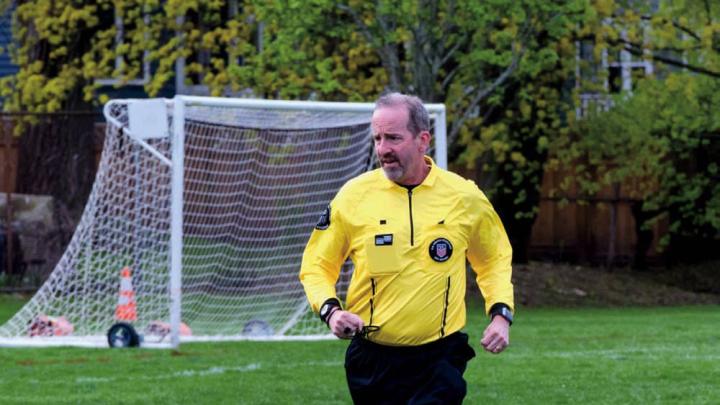In an all-volunteer youth soccer league, brave parents must rise to the occasion and create order from cleated and shin-guarded chaos. In the early 2000s, one such parent was Frank Doyle, now dean of the Harvard Paulson School of Engineering and Applied Sciences (SEAS). He had enjoyed playing soccer in high school and was ready for his next challenge: refereeing small children as they broke the sacred commandments of The Beautiful Game. “It wasn’t that you were rigorously enforcing the laws,” Doyle explained in his office. “You were working with young kids and helping them learn the game of soccer, but you were keeping it fair, fun, and safe along the way.” He was a professor at the University of California, Santa Barbara, so the teaching role appealed to him. So did the referee’s duty not just to call fouls, but also “to manage the game in a very thoughtful and creative way.”
What started as a way to keep himself out of the lab and in the company of his kids became a side passion. Within a few years, Doyle earned the highest certification within the American Youth Soccer Organization (AYSO)—National Referee. That required completion of at least 100 games, a tough exam, three in-person assessments, and a physical test, which included an endurance run and two speed runs. At night, Doyle would scroll through AskTheRef.com, where refs posed oddball questions about unusual situations and the world’s best officials would answer. “There are really all kinds of wacky scenarios in a game,” Doyle said. “Like, if a substitute player throws a water bottle and hits a player on the field—what’s the restart?”
After accepting the SEAS deanship in 2015 and moving to Massachusetts, Doyle adjusted to the new soccer landscape. Because of a novel concept—winter—outdoor refereeing was not a year-round option. And AYSO didn’t exist in Massachusetts, so he and his son became certified through the United States Soccer Federation. Soon, Doyle had an idea: why didn’t he become a National Collegiate Athletic Association official?
As he moved to the NCAA level, the pace quickened, the stakes rose, and the margin for error shrank. Tiny mistakes, made by either a player or Doyle, could shift a game’s outcome. He had to stay close enough to the action to detect a foul, but remain situated in a way that gave him wider perspective on the field. Staying in the moment was crucial for making instinctual calls, but it was just as important to anticipate when stopping play would hurt the team it was meant to help. At NCAA games, four refs work in tandem. “If you do it well, you’re completely reinforcing each other,” Doyle emphasized. “You can work in a symphony that’s really exciting and fun.”
He doesn’t bring red cards to his lab or faculty meetings, but he said his disparate roles do connect. As a dean, he pointed out, part of his job is managing emotions and personalities. “And that’s a big part of the game…how you handle the players on the field, how you handle the coaches on the touch line, all the aspects of the game. I think that does suit my personality.” He mentioned referencing, at a recent faculty meeting, the soccer concept of “persistent infringement” while discussing how to handle cases of minor misconduct. “Small microaggressions on the surface—in isolation—are not a huge deal, it’s worth a conversation,” Doyle said. “But an accumulated pattern? That’s different.”
While Doyle doesn’t ref year-round anymore, he officiated 30 games last fall and a few dozen more throughout the spring and summer. Before a game, he’ll check the teams’ records and histories of misconduct to get a sense of the potential mood, and he’ll throw in a few cardio and core workouts during the week to stay fit. If he’s officiating a game on a Saturday, he’ll re-review the rules on Friday to get in the right mental mode. After a game, he’ll check his GPS watch to check how many miles he ran, how quickly he moved, and how efficiently he covered the field. If all goes well, Doyle will be far from the center of attention.
“I had a good friend in Santa Barbara who once said, ‘When Frank does a game, nothing interesting happens,’” Doyle recalled. “I don’t have mass confrontations, I don’t have brawls, I don’t have fights on the field. It’s about the highest praise you can give to a ref, right?”








